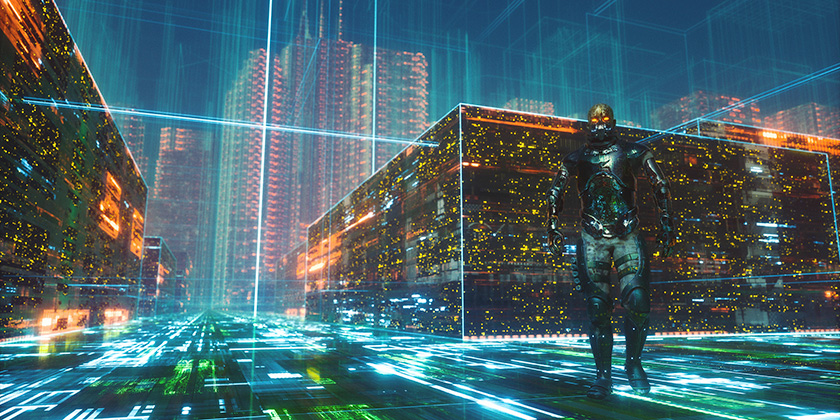Share this article on:
Powered by MOMENTUMMEDIA
Powered by MOMENTUMMEDIA
Breaking news and updates daily.
Why not apply the same intellect and wisdom that created this wondrous cyberspace and its data galaxies to empower our appointed guardians to protect our information with the tools they need to do their job?

Guardians of the new galaxies
Tomorrow’s cyberspace will include metaverses that draw-out 3D virtual worlds from yesterday’s 2D internet. Spaces where humans and machines interact in virtual-reality environments. Your information will be exchanged across many such new and diverse places, media and timescales to before. You will make decisions around information in different ways. Information warriors, police, custodians; both human and machine in concert, will extend the physical universe’s legislation and policy making into these galaxies of cyberspace and, they will act as our guardians as we collectively seek to boldly go where no one has gone before.

Humans are the inflection
In Trusting information: it’s a jungle out there we explored historical connections to information protection and the way in which humans interact with one another. Just as it has always been in the physical space, cyberspace is a mere reflective pool of human construct. Cyberspace is necessarily by, of, from and for humanity.
Cooperation, competition, crime and conflict all contribute to inter-human dynamics in cyberspace too. Since its inception, cyberspace has challenged global norms of sovereignty. Historically established physical borders that are enshrined in international laws are difficult to replicate in a multi-dimensional metaverse. We cannot coexist lawlessly. Too much of our modern lives intersect digitally. The role of the individual, and the way their information is relevant to their lives is resultantly different because of these virtual worlds.
Guardians of the new galaxies are relied upon to defend, commit aid, to police and offer safe custody for our most sensitive elements of information. Who are these guardians? Have we empowered them with sufficient balance in their powers to know too much or just enough to protect us? Where are they? Does their physical location matter in relation to how we trust them and their motivation? Are they even human? What centralised body is even calling the shots about this thing called the ‘interweb’?

Cyber-crime in Australia
In July this year, the Australian Broadcasting Corporation (ABC) reported that Australia and the rest of the world is facing a “tsunami of cyber-crime” with a 60% increase in ransomware attacks against Australians in twelve months. According to the ABC, the Cyber Security Cooperative Research Centre’s policy experts are calling for mandatory reporting of cyber-attacks, challenging the legality of even paying a ransom. According to the Australian Competition and Consumer Commission, in 2020 Australians lost a record-breaking $851 million plus to scams across all reporting mechanisms (cyber and otherwise).
Telstra’s CEO, Mr Andrew Penn, was appointed to lead an Australian industry advisory board to assist the Federal Government’s cybersecurity strategy in 2020. The board’s recommendations were published around the same time the ACSC released new steps to support cybersecurity strategies all Australians can take to protect themselves from attacks. Our appointed guardians are in the trenches challenging emerging threats in cyberspace in multidimensional battlespaces.
Challenge the paradigm
Perhaps we have viewed cyberspace’s extension of our physical environments incorrectly. By seeking to extend the legal and policy arms of national governments into the anthropologically derived future metaverse, have we fundamentally misunderstood what we ourselves have created? The metaverse is the wild west of the human imagination, it is the Wizard of Oz meets Star Trek and Pixar all at once.
Yet it is also inextricably linked to our real universe. A genuine crime, act of terror or assault against another human being or entity in cyberspace cannot occur, for it not to be felt in the ‘real world’. We have a responsibility to ourselves to strengthen our own cyber-defences, in order to make the greater whole stronger. By thinking and acting locally, so that we can participate globally, we can ensure each link in the digital information chain is as strong as it cannot be. It’s not enough to talk about policies, we must live and breathe cybersecurity in everyday life as we do our physical security.
We cannot coexist lawlessly. Nor must we allow our established biases towards lawmaking and protective mechanisms constrain our approaches to information exchanged through cyberspace. Instead, we can apply the same intellect and wisdom that created this wondrous cyberspace and its data galaxies and empower our guardians we have charged to protect our information with contextually relevant tools to achieve their mission.
Evidently the sophistication, proliferation and extent to which individuals are willing to operate in cyberspace for personal gain is more and more. It is not enough to put all our stock in the processing power and speed of new technologies, however increasingly useful Artificial Intelligence and Machine Learning (AI/ML) will continue to become. New technologies must be explored in concert with relevant and innovative policies, focusing towards the local sovereign capacity to influence the cyber-landscape in which we operate to ensure the best user experience is possible.
We must expand, contort and challenge the paradigm of our thinking: making information protection an exciting field to attract creative minds that do not understand what society looked like before the internet. It is the same minds that are challenging and extending the size, shape, scale and social construct of cyberspace itself that will be our guardians of these new galaxies.

Author: Mycaila Delbridge, Strategic Partnerships, Penten
Mycaila is part of Penten's Business Strategy team working on a range of contemporary security technology challenges through commercial and public sector partnerships. A veteran with almost 20 years experience in the Australian Army, she holds a Masters in Cybersecurity Operations and a Masters in Security & Strategy. Mycaila lives in Canberra with her family.
Penten is an Australian, cyber company focused on innovation in secure mobility, applied artificial intelligence (AI) and tactical communications security.
In 2019 and 2020 Penten was awarded Cyber Business of the Year at the Australian Defence Industry Awards. In 2021 Penten won Emerging Exporter of the Year and Exporter of Government Solutions in the ACT Chief Minister’s Export Awards.
For more information visit www.penten.com
Be the first to hear the latest developments in the cyber industry.